#religiousity
Text
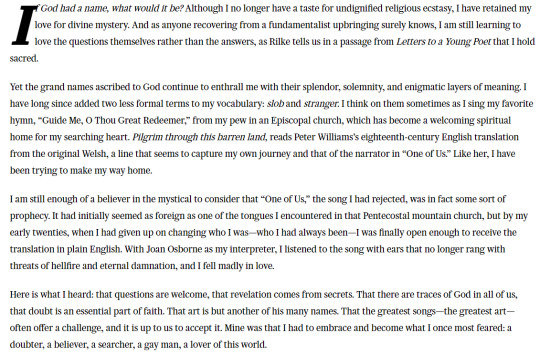
Jason Kyle Howard, "If God Had a Name," (on Joan Osborne's "One of Us") in Oxford American (2020)
#op#essay#religious writing#spirituality#theology#music criticism#creative nonfiction#joan osborne#pentecostal#literature#oxford american#southern gothic#queer literature#jason kyle howard#prose#religiousity#literary journalism
6 notes
·
View notes
Text
Good analysis, worth a read.
#America#fascism#neofacist#nationalistchristians#trump#violence#hate#transgressions are the thrril#politics#religiousity
3 notes
·
View notes
Text
Is the Asbury Revival a Real Revival?
by Samuel Sey
Fromslowtowrite.com <visit Samuel’s webpage here
I’ve been to more “revivals” than I can count. I grew up in churches where “revivals” were the norm, not the exception.
I actually became a Christian during a “revival” at a youth retreat. After a weekend of preaching, “prophecies,” prayers, and “casting out demons,” most of the people at the youth retreat accepted the altar call, repeated the sinner’s prayer, and made professions of faith in Christ.
Within weeks, however, the vast majority of the people who professed faith in Christ had returned to unrepentant sin. So I’ve seen firsthand how emphasis on “revivals” instead of repentance harms so many.
It’s with that in mind and the authority of the Bible that I hesitate to call what is happening at Asbury University a “revival.”
That hesitancy, however, is offensive to people who seem to think it’s Satan, not God, who said:
“Beloved, do not believe every spirit, but test the spirits to see whether they are from God, for many false prophets have gone out into the world” (1 John 4:1-2).
Over the past week, seemingly anyone who shares any caution or concern over some of what’s happening at Asbury University is immediately labeled a “Pharisee,” a “Doubting Thomas,” a blasphemer, and other silly accusations by people who hypocritically attack their brothers and sisters in the name of defending brothers and sisters at Asbury University.
In some ways, just as woke Christians weaponized the George Floyd incident to pressure some Christians into accepting their definition of racism—some Charismatic Christians are trying to weaponize the Asbury “revival” to pressure others into accepting their definition of a revival.
But whether it’s Charismatic Christians or woke people—anyone who demands only submission or silence on their opinions over debatable issues isn’t operating in love.
Love does not insist on its own way. Godly people try to persuade others who disagree with them. Ungodly people, however, try to pressure others who disagree with them.
Nevertheless, the Asbury “revival” started after a 10 am chapel service last week, Wednesday, when a group of about 20 students and the worship team said they felt prompted by the Holy Spirit to continue worship past the end of the chapel service.
According to one of the students I talked to, a few hours later, the president of the seminary sent an email to the students encouraging them to visit the chapel to join the 20 students on what he described as an outpouring of the Holy Spirit. Apparently, 200 students arrived for worship at the chapel soon after, and there has been non-stop worship ever since.
The student maintains the “revival” wasn’t planned. But it’s worth noting that Asbury University is part of what is known as the revivalist movement—a group of Charismatic Christians who consistently attempt to produce revivals.
This is why the university’s website says:
“Asbury University has been known through the years for its history of great revivals. There have been several occasions when significant moves of the Holy Spirit have swept the campus and reached across the nation.”
In fact, besides this current “revival,” Asbury claims they’ve had 8 revivals.
I’ve talked to current students, recent graduates, and several people who’ve visited the chapel to experience the “revival,” and there are unquestionably several reasons why we should be concerned.
Though one student says the gospel has been consistently and explicitly preached since the beginning of the “revival,” others contradict that claim. In fact, one former student who was at the chapel this week told me he rarely, if ever, heard a clear presentation of the gospel at the school.
Another student said: “Attending the few chapels I have at seminary, apart from one [or] two chapels that preach a biblical message of repentance, it’s always been about ‘being who you are’ and God loving you ‘as you are.’ There are a lot of messages that are about being ‘true to yourself.'”
I’ve watched hundreds of videos of the “revival,” and I still haven’t seen any clips showing a clear preaching of the gospel. Of course, that isn’t evidence that people aren’t preaching the gospel.
Still, progressive Christians like Tim Whitaker at The New Evangelicals have essentially endorsed the “revival” after his visits to the chapel this week. Moreover, he says LGBTQ students at the school told him the university protects them from “conversion therapy.” According to Whitaker, the LGBTQ students who were “worshipping” at the chapel also say they’re especially hopeful the “revival” will create (progressive) change at the school.
That lines up with what one student said to me: “Unfortunately, I have first-account experience and conversations with people who are attending and speaking on the ‘greatness’ of revival who are actively living in sin (to be blunt).”
Furthermore, some of the preachers at the chapel are women. And there are also several people “prophesying,” speaking in tongues, “casting out demons,” and “faith healing” at the chapel.
So with that said, is the Asbury “revival” a real revival?
Because of the seemingly little or no gospel preaching, the female pastors, [and] the disorderly and charismatic chaos, I’m inclined to say “no.”
But in a sense, whether I think it’s a revival or not doesn’t really matter, anyway. The word “revival” isn’t a biblical term. Source
Geri Ungurean
Shalom b’Yeshua
MARANATHA!
#asbury#college#kentucky#real#?#churchianity#religiousity#social#christians#charasmatic#chaos#true#revival#or#awakening#maybe#just#an#event#lgbtq#women#men#children#teens#students#orchestrated#tongues#demons#fake#healing
3 notes
·
View notes
Text
I wish Kira Nerys was real so i could talk about liberation theology with her after getting wasted on spring wine.
10 notes
·
View notes
Text
really though i get why the knee-jerk reaction to antinatalism is “oh so you hate families? you think the household should be destroyed?” but the answer is “yeah, because communal childcare/babysitting and housekeeping (meals, laundry, etc) makes everything easier for everybody”
2 notes
·
View notes
Text
feeling very glad about working for an organization where kids can show up with blue hair and pronouns and it's not even a little bit of a deal, instead of one where i have to desperately try to reassure kids that they're not evil for being gay and god doesn't hate them while simultaneously trying to avoid implicating myself lest i be fired for being queer
#adventist camps can burn#never have i been so underpaid for doing so much work while being so mediocrely treated. and never will i be again#the intentional non religiousity of this camp is so so freeing. also it helps that all but like 3 of the staff are flavors of queer/trans#ok i took a muscle relaxer and words are starting to lose their meaning bye#anyway thank you girl scouts#me
36 notes
·
View notes
Text
Went on a date and the person took me to a French restaurant and loudly talked about how Brexit was a good idea.
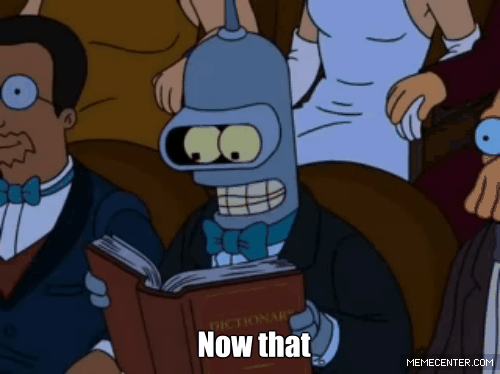
#i left before desert#i really wanted a religiouse#but not at the cost of sharing a table with an idiot
7 notes
·
View notes
Text
imagining little carting or single seater euro champ lewis keeping his catholicism on the DL, before getting into f1 and later moving to merc and wearing some of the most gaudiest crosses and crucifixes, before getting multiple god and jesus and cross tattoos all over his body
#him first embarrased about his relationship to god. then being loud and proud. then finding a permanent but quieter medium to be religious#lewis and his religiousity is so interesting to me
2 notes
·
View notes
Text
have to say im enjoying myself immensely reading the turkish translation, it's just hilarious and i can tell the translator was like. yeah im gonna translate the fuck out of this
#tlt#he went and beyond to incorporate the slang. the memes. the curses. the religious phrases. i can tell he enjoyed it#also his religious wording is really...idk. islamic? i mean probably these words are also used in turkish christian circles but i always#associated them with islamic imagery which is another layer of religiousity i hadn't considered about the book#not that he converted the quite obviously overt christian imagery to muslim things just that my perception is different
0 notes
Text
Okay but Adam is so sick for making Max kneel by force and plead for Adam's safety, making it very clear that the only good thing that was left in Max's life was Adam's love and friendship, and by his own pleading to protect Max, he reassured MJF that Adam actually would give his safety away just like that for Max... only for Cole to reveal all of this was probably a very elaborate plan to mind fuck Max two seconds later.
The ultimate expression of love, according to Ibrahimian religiouses, is sacrifice, Max was ready to sacrifice himself for Adam, and he believed the reverse of that was also true.
To bring someone down to the dead end in mere seconds from highest of highs of love is very twisted, lol.
94 notes
·
View notes
Text
A lot of atheists, mostly those with a family history of Christianity, celebrate Christmas and Easter and engage in other Christian-derived cultural practices, without believing in Christian doctrine or identifying as Christian. A lot of atheists, mostly those with a family history of Shinto-Buddhism, celebrate Oshōgatsu and go to shrines and engage in other Shinto-Buddhist practices without believing in Shinto cosmology or Buddhist doctrine or identifying as Shinto or Buddhist. These two situations are not exactly analogous, due to the different relationship between belief and religious identity in the West and in Japan, but they are roughly analogous.
A very different phenomenon is secular Judaism, where people may be atheist in belief but do in fact identify as Jewish, and, very often, make holding to certain elements of Jewish practice a significant part of that identity. This is far less analogous to the above two situations.
For many people, the idea of being "culturally Jewish" was their first conscious exposure to the concept that people can engage in religious practices without endorsing the given religion's (usual) cosmological and ethical precepts. I think often, these people wrongly extrapolate that cultural Judaism is a type-case for this phenomenon, when in fact I think it's something of an outlier. That is to say: insofar as "cultural religiousity" is a coherent concept, you will not reason coherently about it if you assume that cultural Christianity and cultural Shinto-Buddhism work in much the same way as secular Judaism. They simply don't, and a large proportion of the bad arguments I see on this topic have as their central error the assumption that this is the case.
353 notes
·
View notes
Text
1670's costume department being great OR how zofia's relationship with rozalia is reflected in her wardrobe
Zofia starts off as a very closed-off character with a morbid sense of humor and equally morbid religiousity. That's the thing that is the most visible about her. Over the course of the story she changes and grows, her bond to Rozalia changes her, makes her life better. And this is so very clearly seen in her costuming I couldn't not talk about it. Spoilers for the first season of 1670 ahead.
To start, the first two episodes. These show her in quite the same way - she is covered head to toe in black (and bits of brown) with a crucifix as her only jewelery. The fabric varies, of course, but the color stays the same old black. It may also connect her to Jakub, also covered in black as a priest. Thus, black shows not only her obsession with death but also her devotion to religion (in her second scene she literally lies on the floor like a cross chanting ave maria)

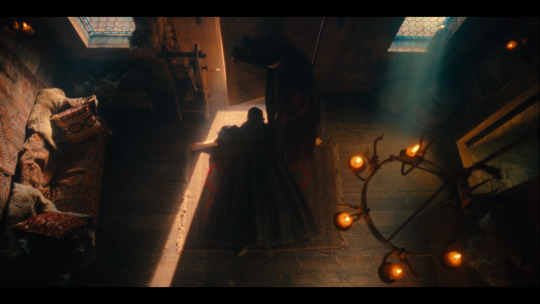

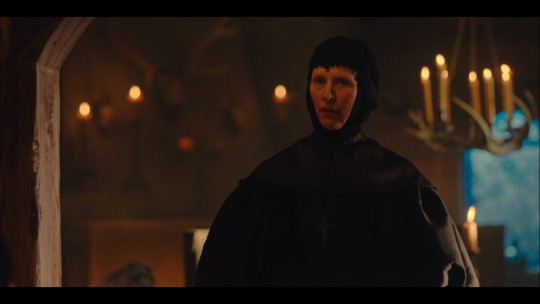

(not important, but i just love how Zofia and Jakub are mother and son in terms of looks. especially noticeable when they stand closely)
The third episode brings changes from the very beginning. This is when we meet Rozalia, and right away Zofia is different. Rozalia comes and brings the air of spring and violets; Rozalia comes and Zofia wears something white. (TBF this is an important day, a celebration of sorts, so white is sort f Moreover, she shows her skin - first behind a white collar (but we still see quite a lot of skin) and then we see her in her bedroom for the first time, and that's when we first see her that vulnerable - when she talks to camera of Rozalia bringing her worries. When everyone leaves, we see her in her bedroom again, holding Rozalia's finger, and again she is covered fully in black, maybe assuming she will not encounter her again.

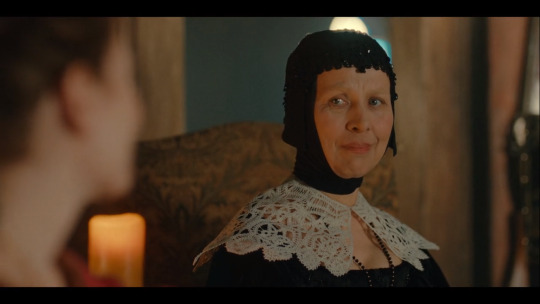


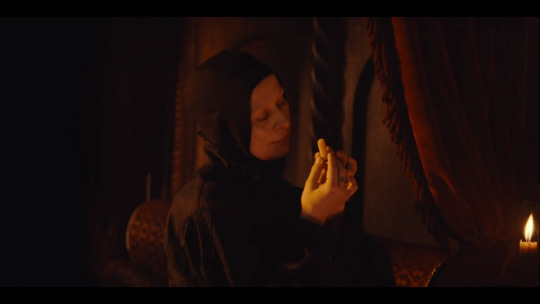
Next two episodes we see none of their interactions, but Zofia is changed already. She begins wearing blue and violet - barely distinguishable from black in the candle light of her home at times which may be a coincidence and a trick of light yet may also symbolise that to her family she is the same, more or less. But in the light of day the blue and violet are bright and vibrant, as though she can't hide from everyone completely however she tries. And she does try - blue sleeves may catch your eye but the overcoats and overskirts stay black or dark.







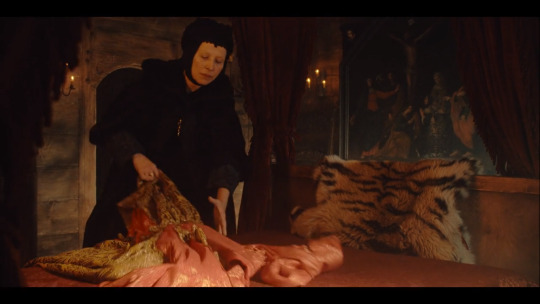
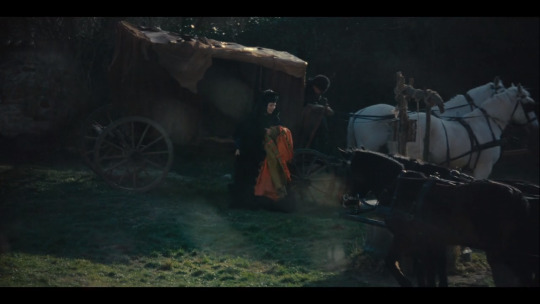
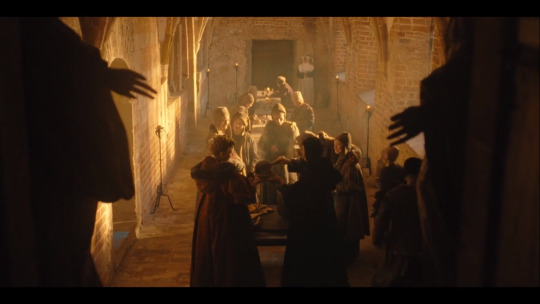
The nest episode, Zofia starts talking about someone new in her life - yet with her husband entering and mentioning Henrik she changes it for their lives, life of the family. And telling this, she is wearing the same dress but even more open without a collar and seemingly vibrant (so bright it is noticeable even in the house - showcasing Aniela suspects something is going own?). Her crucifix is also higher on her chest and her caul/cap/hood is decorated. After meeting Rozalia she feels and is brighter, happier, and it is almost harder to hide.
(While this outfit does have a purpose in the episode, I do believe there was an opportunity to just let her wear the same black-and-white dress from the second episode. Or to make the lightning more similar to make her dress appear darker. So I think this isn't too much of a reach to say that this at least somewhat shows her changing because of the previously shown date with Rozalia.)


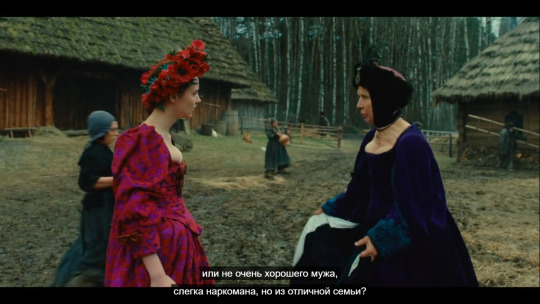
And finally, the last episode. The wedding. Time to wear the fanciest clothes. And not only Zofia wears a bright red dress, she also loses her caul/cap/hood exposing her bright ginger hair (perhaps a metaphor for her inner self being eager for some love and happiness that religion, marriage to Jan Pawel can't provide?). Her crucifix is quite high up this time as well and hangs on a string of white pearls, as compared to the previous black beads.
It could be noted that red symbolises love and passion, so not only is the color appropriate in the context of the wedding but also in the context of her love to Rozalia (and passion - having sex in your and your husband's bed while the husband could potentially come in is an interesting decision).

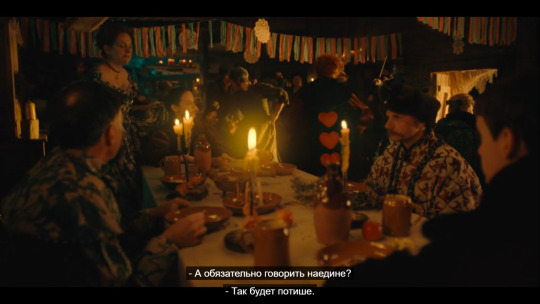
(just a note - when Zofia leaves with Rozalia, her overcoar has these cute hearts on it. she doesn't get an opportunity to wear it again.)
Although she loses Rozalia later (and drowns her sorrows in the tavern), her dress doesn't change. She is changed by their romance. Not her dress, not her hair, not her crucifix. Not one part of her that was changed by love is given up, whatever she says of family coming first for ever and ever.
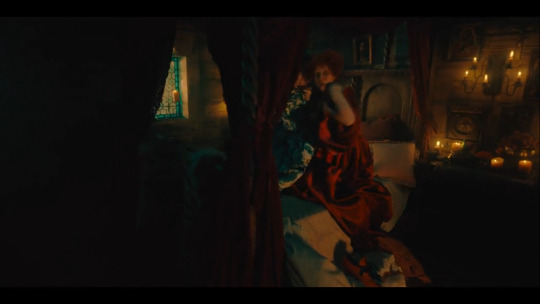
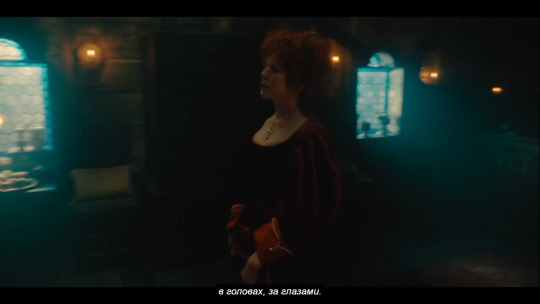

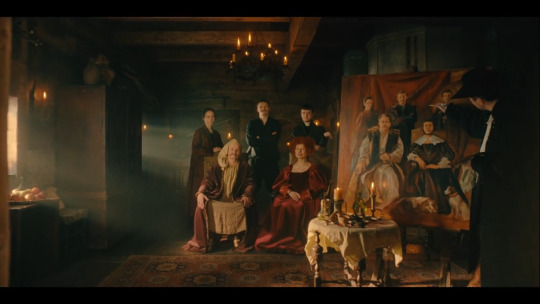
What fucks me up the most is this final portait. It feels like some wwdits shit, I swear to gods. The way that she is changed and doesn't attempt to hide it and yet the portrait shows the early, unhappily married, closed-off version of her? And her dress is the one she was wearing during her first meeting with Rozalia? Insane shit. I understand that this has some white so this is probably supposed to be just her in her Sunday/good clothes; but also, I remember the sweater and earrings I was wearing on my first date with my first girlfriend. And I would believe Zofia does, too.
TL;DR: Zofia's outfits change during the 1st season of 1670 as her relationship with Rozalia grow; her life, as her dresses, become brighter and more colorful because of love she found; and the said love, however broken up they are in the end, stays with Zofia despite her choosing family over it. All the while she barely changes for her family.
#1670#zofia adamczewska#zofia x rozalia#aniela adamczewska#the team behind 1670 was so insane for this honestly#i was tearing up and choking on thin air because of the portrait btw#love myself some clothing symbolism and when it's also lesbian? let's just say i'm. unwell. because of it. deeply.#also i just love the unexpected old women yuri#when i first saw them i went a little insane because i assumed it was fandom speculation but 1670 is just that good#something something no love is wasted#however brief it was it mattered
26 notes
·
View notes
Note
as a queer jew i find it hard to explain to goyim why i still prefer to be religious and why i dont think those two part of who i am inherently contradict each other, do you have any talking points you bring up? or a good way to explain it?
Well, as a religious observant queer Jew.....
Here are a few things I say:
-My ancestors have risked their lives for thousands of years just to be able to stay religious, I am honouring their sacrifices by maintaining my heritage
-Being queer doesn't contradict me being religious. There are seventy facets to Torah, some Jews I agree with, some I don't, that's how Judaism works. There are different interpretations to everything in the Torah.
-Being queer made me appreciate my Judaism and religiousity more. I went through a period of self-loathing, but accepting my queer identity made me stronger in my religious life because I chose to continue being religious and practice Judaism, despite obsticles and doubts.
-I am created in the image of G-d. G-d is multifaceted and complex, just as I am. I am honouring G-d by loving myself and my body and how He made me.
-There are so many other Jews like myself, and throughout history. Being queer and religious isn't a contradiction.
-My soul was there at Mount Sinai. G-d gave the Torah to me as a gift, and the Torah is mine and my inheritence.
-We are B'nei Yisrael, the Children of Yisrael. Yisrael means "debates/wrestles with G-d". Yes, sometimes my identities seem to wrestle with each other, but ultimately they compliment each other in a beautiful harmony.
-It's not anyone else's business, and certainly not a goy's business, how I choose to express my queer and Jewish identity. Goyim have been trying to supress Jewish religiousity and expression for millenia. I will not let them.
I hope these points help!!
#jumblr#judaism#jewish identity#antisemitism#homophobia#transphobia#queer jew#trans jew#religion#spirituality
160 notes
·
View notes
Note
people have obviously spoken at length about OnlyOneOf's MVs, mostly stuff from Libido onwards, but i'm curious your thoughts on their earlier material and the themes/references they were exploring and making. Like i was watching Savanna recently and it's so interesting the use of computer glitch effects and being seen through other lenses, that they were already exploring that "artificiality" of the entire performance (like they do in skinz) even at that stage.
i feel like i definitely talked about angel at one point but who fucking knows anymore, i sure don't. i actually think that libido and the be series are building off of the blocks made in their earlier mvs. i love how strong and literal the techno-religiousity of angel savanna sage etc, it's that literalness that establishes that this group is taking on the challenge of trying to deconstruct the highest concepts of what an idol is, and how that concept interacts with the world around it. the advantage of spectacular imagery is that it allows you to manifest your metaphors physically. techno imagery especially, like how the techno orientalism of cyberpunk is a manifestation of the west's fear of asia's rising economic power in the 80s. so by spelling out these religious and idolatrious ponderings in glitches and visual effects, it lays the bricks of intent for this alt idol group that pays off in mvs like libido and skinz where we might have lost the visual depictions of being seen through other lenses, but the voyeurism is stronger than ever.
#its a very interesting distillation of idea:#sci fi is a speculative genre by nature so it allows for these grand visions and questions to be made manifest large#but then there's a narrowing down to a handful of tigher ideas that have a more focussed point#in this instance specifically going from the quite literal idol = religion ? to voyeurism and expectation and perception of image#so i dont think their 'loss of aesthetic' was a loss really#but more of an 'we arent asking questions about what an idol is anymore. we know and we will use it against you'#onlyoneof w#text#answers#i know people didnt like the dopamine mv but that was the purest of vodka. literally just hot guy calvin klein ad#the rotating sparkly torsos really got me like damn they really said 'is this all you care about? hm?'#and calling it dopamine too that was the cherry on top. mwah chefs kiss you did it you boiled being an idol down to its bare essentials
9 notes
·
View notes
Text
the amount of religiousity combined with psuedoscientific medical jargon that exists surrounding the topic of addiction in popular culture today is literally no different than rhetoric from the 19th century...like we have not evolved at all
54 notes
·
View notes
Text
Thunderclash and religiousity is a peculiar subject that I kinda want to talk about more, but it's hard to put thoughts i have cohesively. I just think he abandoned Primus long ago and decided to take matters into his own hands and do as much good as possible despite all the evil (that he himself might have endured plenty).
9 notes
·
View notes